#this has a very specific target audience but i wanted to draw something self indulgent for my birthday (21/5)!
Text
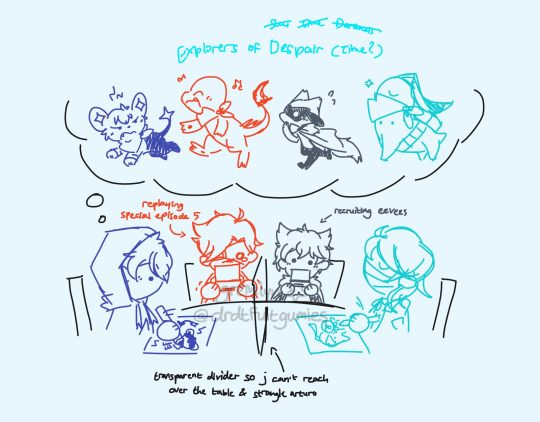
four people who i believe are the most likely to have played pokemon mystery dungeon: explorers of sky during their childhood, permanently altering their brain chemistry. source: trust me
#danganronpa despair time#drdt#fuit gumy art#original situation#xander matthews#arturo giles#j rosales#nico hakobyan#i think they would play as charmander (xander) chikorita (arturo) shinx (j) and riolu (nico)#while some of their preferred partners would be treecko (xander) piplup (arturo) vulpix (j) and eevee (nico)#i am open to being peer reviewed. i also accept headcanons for other characters and pmd games#this has a very specific target audience but i wanted to draw something self indulgent for my birthday (21/5)!
109 notes
·
View notes
Text
Killing Eve: Episode Analysis
*SPOILERS*
Season 1, Episode 1 - Nice Face
The episode begins with our introductions to Villanelle, in an ice cream shop; and Eve at home with Niko, with Eve’s scene continuing to show her work dynamics.
I discuss these two first scenes at length in two of my previous posts, that I will link at the bottom of this post, as well as here: Villanelle, Eve.
In a nutshell - Villanelle’s first scene, she is introduced as distant and inaccessible to those around her yet still acutely observant, evident from the mimicking of the young man behind the counter. The knocking of the ice cream onto the little girl sat opposite her shows that she also has a cruel aspect to her character that is hidden beneath her friendly and unassuming exterior. From Eve’s scenes we see that she lives an incredibly unexciting life where falling asleep on both your arms is considered to be scary and justifies blood curdling screaming. We also see that Eve doesn’t act particularly professionally but has a perceptive and intuitive mind, illustrated during the meeting when considering who killed Kedrin.

Back to Villanelle, who has returned to Paris and has indulged in some extensive retail therapy. She’s taken her brunette wig off and we can now see her natural hair which is out, as it often is when she’s not doing a job. She is, however, still in the top and trousers from her earlier disguise. This means that we’re getting more insight into her character, but as she’s still half in disguise we can see that she’s still putting on her facade. She even politely picks something up that the man in front of her has dropped, maintaining her outward image and unassuming ‘nice face’.
The song playing through this scene is a french song, called ‘Il Voyage’ by Françoise Hardy. After a quick google translate it seems that the lyrics of the song are, as usual, a perfect fit for the scene. It’s a fitting representation for both how those who come into contact with, and we as the audience, see Villanelle.
The lyrics translate as:
“When you talk to him he doesn’t answer.
He seems to be watching you, you think he’s listening.
His eyes are there on you, but you won’t read it.
What he thinks of you. Do you think he’s thinking about it?
Or you walk on the street.
He lets go of your arm and neither seen nor known he disappears.
He is no longer there.”
These lyrics reflect how removed from others and unattainable Villanelle is. How she blends into the background seamlessly when she needs to, but has quiet observant eyes over those she watches and judges. Even the title of the song, which translates as ‘He Travels’, is applicable for Villanelle who is never in one place for long as she is always travelling across Europe to complete her kills.

Making her way back to her apartment, Villanelle passes a middle-aged looking woman with dark curly hair and an obvious resemblance to Anna. Villanelle’s eye is instantly caught by the woman and she maintains her stare as the woman walks past her.
This is the first of three moments when Villanelle notices different women who resemble Anna. The second, is at the end of this episode, when she sees Eve for the first time in the hospital toilets. The third, is in S1E2, when she is out walking with Sebastian. Each of the three times this happens, Villanelle has an incredibly strong visceral reaction to being reminded of Anna. After the first time she mocks the elderly lady, who lives in the apartment opposite her, for her slow walking; the second time she kills the entire room of hospital staff, not just her target Kasia; and the third time she immediately cuts her and Sebastian’s walk short to go back to Sebastian’s apartment to sleep with him.

A nice showcase of the attention to detail on the show is how a single draw can be used to show how Villanelle’s private life and work life intermingle in her living space. The contrast of having her razors, nail polish and tampons (all considered very feminine objects) in the same draw as her gun and bullets (stereotypically considered masculine) shows the contrast of a woman in a line of work that would usually be considered a man’s. Also notable is the fact that the tampons and bullets are presented identically; both in boxes and the same shape and size.
Similarly, the french song in this scene, ‘Roller Girl’ by Anna Karina, with the lyrics translating as “I’m the girl we stick on the Harley Davidson, BMW’s, 16 ton trucks” - in the same way as the draw, the lyrics emphasise the contradiction we find in Villanelle, between what is typically considered to be masculine and feminine.
The mirrored order of Eve and Villanelle’s scenes is significant as we first see Villanelle ‘at work’ and then proceed to see her at home, but with Eve we first see her in her casual setting at home and then at work. This shows the contrast between the two aspects of both their lives - professionally and personally. Professionally, Villanelle is calm, collected and confident; whereas Eve is more scattered and all over the place. Personally, Villanelle is alone with no real connections; whereas Eve has a husband and a number of coworker friends.
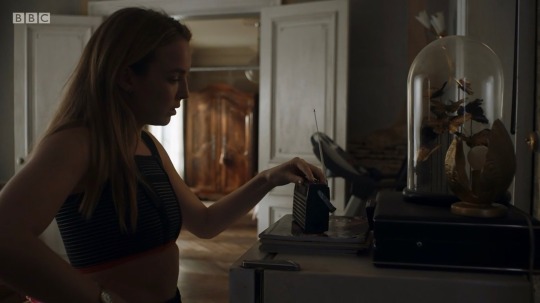
Continuing to settle back into her apartment we see Villanelle place the brunette wig we saw earlier, who she calls “Loulou”, on a wig stand. Giving the wig an affectionate name demonstrates how she considers her disguises to be like different people with individual personalities, perhaps she draws inspiration for the disguises she uses based on people that she’s previously observed.
After taking off her top we see that Villanelle is wearing a chest binder underneath, another ‘blink and you’ll miss it’ moment, but an important one as it explains why Kasia tells Eve that the killer was “ale decha” (flat-chested).
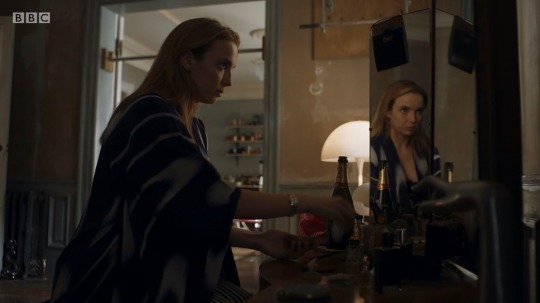
Villanelle’s vanity, and the importance she places on superficial things such as he looks, is shown when she examines herself in the mirror.
Mirrors are a recurring theme in Killing Eve, often used generally to symbolise self reflection, and specifically used in the show to illustrate how Eve and Villanelle see themselves mirrored in one another. In this instance, the mirror highlights how Villanelle’s self reflection currently only goes as far as surface level. She prioritises her beauty and material things, and as shown during her conversation with Eve in S1E5, she neither questions nor concerns herself with why or who she is killing.
These aspects to Villanelle are presented in the lyrics of Unloved’s ‘When a Woman is Around’, which plays when she is in Tuscany.
“I don’t pretend to know the ways of the world. A means to an end seems the way”
- Villanelle doesn’t care about why she’s killing, she’s good at it and it’s just the means to an end for her so she can earn money and have the lifestyle she wants.
“Who has the most of whatever’s best”
- Whatever’s best to Villanelle is beauty, money, clothes and power, all of which she does have the most of.
“Truth is seldom found when a woman is around”
- Again emphasising that no-one really knows Villanelle.
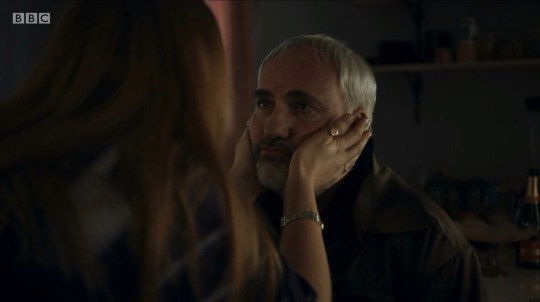
Villanelle’s boredom that she talks about in the speech she makes as Billie in S2E6, where she says that she’s “just so bored”, is shown here through the joke she plays on Konstantin; as well as her telling him she “just want[s] someone to play with” in Tuscany.
Her childish side is also shown again, which is explained much later in S3E5 when Villanelle tells her mother she wants to feel like a child. It shows her want for the parental connection that she lacked as a child. A connection she felt she had with Anna and sees to some degree with Eve, but currently only has in Konstantin as a father figure, asking him if he’d be sad if she died and he gives a sincere reply of “of course”.
Taking in mind Carolyn’s question to Eve in S2E7 “any escalation? Increased attention-seeking, recklessness”, a question she asks about Villanelle and concerning Eve herself; when looking back on this first episode the inkling that both of them were already starting to ‘go off the rails’, as well as how they both sit somewhere on the psychopathy scale when the series started, is apparent. This is shown from Villanelle in the pretend suicide attempt, the fancy hairpin, the unnecessary killing of everyone in Kasia’s hospital room, Carolyn telling Eve that “frankly she’s [Villanelle] starting to show off”, Konstantin’s worry that Villanelle might get caught and asking her in S1E2 “why are you being naughty?”, and killing Bill when she was told not too. It’s shown in Eve in her cutting her thigh, her interviewing and recording Kasia illegally, telling Elena not to tell Bill where she’s gone and endangering Dom by taking him with her to speak to Kasia.
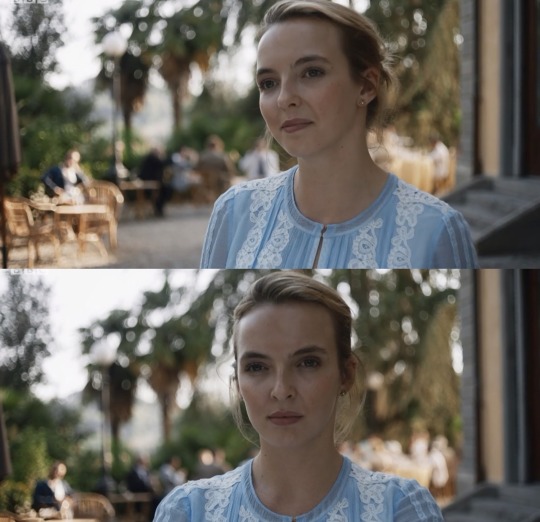
Although earlier she knocks the ice cream onto the little girl, we do know from Tatiana’s treatment of Villanelle’s half brother, Bor’ka, and Villanelle herself when she was a child, that she doesn’t like children being treated cruelly by family. As Villanelle observes Greco and his grandson Davide playing with each other, we get a close up of her from a slight angle as she smiles. She seems to be enjoying the moment that they’re having together, maybe briefly forgetting she’s on a job and reminiscing about memories she had with her own father, who we know from S3E5 that she had a much closer relationship with than her mother - he taught her to fight, did woodworking with her and laughed at her jokes.
As soon as Greco pours the water over Davide’s head, we see Villanelle shift immediately. Her expression becomes harsh as her smile drops and the angle is now straight on Villanelle’s face showing she has been snapped out of the moment and is once again focused on the task at hand.
We see the pleasure Villanelle derives from watching the spark drain from someone’s eyes. We repeatedly see this with Villanelle, in S1E2 at the Bulgaria kill and the perfume kill, S1E3 the Fat Panda kill, Villanelle speaks about it to frank in S1E5 and Dasha talks about it in S3E7.

As well as having all her books, DVD’s and articles on female assassins; the fact that Eve is cutting her leg near her femoral artery and knows exactly how she’d kill Niko (when it hadn’t even crossed Niko’s mind how he’d kill someone), once again displays how we’re unsure if Eve just has a particular interest in female killers or actually wants to be one herself. This is something that Eve represses, shown in S2E5 when she considers pushing a man onto the tracks in the tube station and in S2E8 when Villanelle tells Eve “it’s what you wanted!” after Eve killed Raymond, but Eve rejects this.
Eve asking Niko “do you want to have sex”, just accentuates the extent of the dullness of Eve’s life and her relationship with Niko. It’s conventional, there’s little to no spark left between them and certainly no excitement or spontaneity left, it’s treated almost like a chore to be done. This is contrasted in the following scene with Villanelle, who Konstantin finds sleeping next to a man and another woman - not explicit but this short moment is all that’s needed to convey the difference. We also get a subtle suggestion of Villanelle’s preference to women, as she has the other woman’s arm wrapped over her.
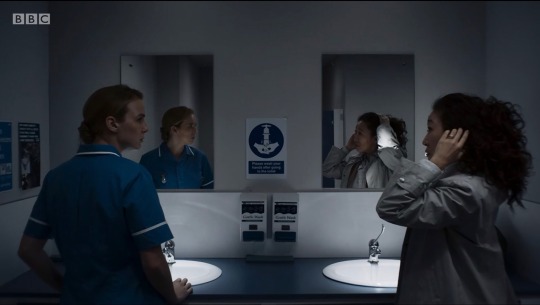
Eve and Villanelle’s very first encounter with one another.
Villanelle is obviously struck by Eve’s resemblance to Anna, so much so that it almost looks as if she isn’t even going to speak to Eve. The inclusion of the mirrors and the satisfying symmetry of this shot demonstrates that similarity between the two of them that we often see. It visually represents what keeps pulling Villanelle and Eve towards each other and what Villanelle even says herself in S2E8 is the reason she’s so drawn to Eve - “we are the same”.
This moment of meeting Eve for the first time, as well as when Villanelle breaks into EVe’s house in S1E5, is also the reason why in the same episode Villanelle says she has “a thing about bathrooms” to Frank.
We think Villanelle is going to leave without saying anything but then she tells Eve to “wear it down” just before she leaves. Just as Villanelle is transfixed by Eve and her hair; Eve is also transfixed with surprise at Villanelle’s assertive manner, so much so that she does what this stranger tells her to, and throughout the series Eve continues to touch or let down her hair whenever she thinks about Villanelle.
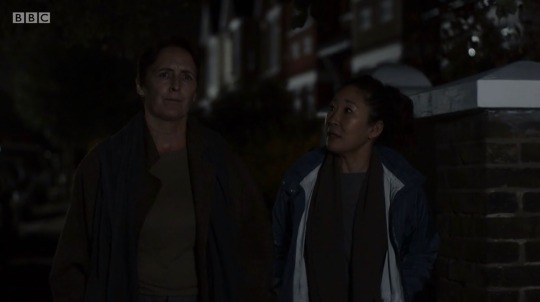
During Eve and Carolyn’s conversation when Eve asks Carolyn if she’s married, she tells Eve “a few times, yes”. This tiny one line, that might seem like a throwaway or filler line at first, actually holds so much weight. Implied within this tiny bit of dialogue is the strain of the secret agent work that Carolyn has done for most of her life and Eve is now getting involved in. The work is so taxing on Carolyn’s private life and maintaining a marriage that it has caused her to be married a number of times. It also foreshadows the fate of Eve’s marriage with Niko, which is also ended due to the strain of Eve’s work on their relationship.
You can read my previous in depth scene analysis here:-
The First Indroduction to Villanelle
The First Introduction to Eve
S1, E2 - I’ll Deal With Him Later
S1, E3 - Don’t I Know You?
S1, E4 - Sorry Baby
S1, E5 - I Have a Thing about Bathrooms
S1, E6 - Take Me To The Hole!
S1, E7 - I Don’t Want to Be Free
S1, E8 - God, I’m Tired
S2, E1 - Do You Know How to Dispose of a Body?
S2, E2 - Nice and Neat
S2, E3 - The Hungry Caterpillar
S2, E4 - Desperate Times
S2, E5 - Smell Ya Later
S2, E6 - I Hope You Like Missionary!
S2, E7 - Wide Awake
S2, E8 - You’re Mine
S3, E1 - Slowly Slowly Catchy Monkey
S3, E2 - Management Sucks
S3, E3 - Meetings Have Biscuits
S3, E4 - Still Got It
S3, E5 - Are You From Pinner? [Part 1]
S3, E5 - Are You From Pinner? [Part 2]
S3, E6 - End of Game
S3, E7 - Beautiful Monster
S3, E8 - Are You Leading or Am I? [Part 1]
————————————————————————————————————————
#killing eve#killing eve season 1#killing eve episode analysis#1x01#ke#villanelle#eve#eve polastri#villaneve#killing eve analysis#killingeveedit#movies#film#cinematography#tv reviews#reviews#good tv#tv recommendations#killing eve spoilers#killing eve discussion#ke analysis#killing eve 1x01#killing eve S1E1#Killing eve nice face#phoebe waller bridge#jodie comer#sandra oh#scene breakdown#niko polastri#carolyn martens
54 notes
·
View notes
Audio
SAM HUNT - DRINKIN' TOO MUCH
[5.33]
What've we got here? Why, it's a CONTROVERSYBOMB!
Ramzi Awn: A bold experiment with a few good ideas, "Drinkin' Too Much" employs dark moments of candor to highlight a muddled mix.
[5]
Olivia Rafferty: The heart and soul of country music is storytelling, which is why this track works so well. "Drinkin' Too Much" shifts the typical country subject of alcohol abuse to the context of sad man R&B, aka Drake's genre. The spoken verses contain a rawness that could only be conveyed with that style of delivery, and the lyrics themselves are so vivid. Lay this over a subtle blend of 808s and slide guitars, and you have a solid attempt to influence the direction of country music. Let the genre-mashing begin.
[8]
Anthony Easton: John Prine, in a recent Rolling Stone cover story, spoke about how Dylan's Nashville Skyline broke apart country music for him (he was a folkie at the time): "Man, there's something there where their two paths crossed. My stuff belongs right in the middle." This is also in the middle: between soul and hip-hop, between the drinking and heartbreak of Nashville and the fame-wasted ennui of Kanye and Drake. But it's also at the bottom: the bottomed-out production, how Hunt trips over details, how he extends stories, how he never quite brags about his money, how his self-loathing bubbles up like swamp gas. It's the opposite of all those party songs, the opposite of Moore and Eldredge and Gilbert. It has a singular voice -- a songwriting voice, but also how he sings, a gravelly push that reinforces his production choices. It is the smartest thing he has done, and maybe the most heartfelt.
[10]
Alfred Soto: I'm no country corn pone. I like electronic whooshes and the kind of manipulation of space more common on Drake or "Climax"-era Usher, but Sam Hunt can't even talk-sing without his sockless boat shoes tripping on his ill-lettered cadences. He comes off like a lunkier Chainsmoker, in the market for any hook that'll get him on the radio and laid -- two of his more admirable virtues. Find better songs, dude, and don't try so damn hard.
[4]
Thomas Inskeep: This non-single posted on SoundCloud is the audio equivalent of a viral video, and like many viral videos, it's also essentially a journal entry set to music. Frankly, it's not up to snuff: this is him doing his rhyming couplets (he loves rhyming couplets) with a woozy rhythm track from Pro Tools or whatever. It also sounds a lot like a demo for Justin Bieber. Most of all, this is slightly creepy oversharing; I want a Silkwood shower after listening to it.
[0]
Elisabeth Sanders: Everything about this is deeply embarrassing, and that's why I love it. While I can't pretend I like this as much as anything off Montevallo, it makes up for it with "I wish you'd let me pay your student loans," and I'd like to submit this as a great entry into a music category I'd like to call "voice-memo pathetic-wave." (The other artist in this genre is Mike Posner with his great, deeply pathetic album At Night, Alone.) The song approximates, sonically and with almost nauseating accuracy, the feeling of being just too drunk enough that the room is spinning a little, being very sad about something that might be your fault in a crowded place at 2 in the morning. BEEN THERE, SAM.
[7]
Jonathan Bradley: In which Sam Hunt pens a letter to Montevallo's Courtney From Hooters On Peachtree and proves himself to not be country music's Drake, but rather its Mike Skinner. The hook is the weakest part; it doesn't resolve Hunt's thoughts but elides them. (The austere "8pm" take works better and is worth a point or two more.) There is frisson in a lyric that pushes too far past the fourth wall, threatening to combust as it reaches the event horizon -- for the non-country, non-rap examples to which "Drinkin' Too Much" draws nearest, look to emo acts like Cursive's The Ugly Organ or Say Anything's "Every Man Has a Molly." "Hope you know I'm still in love," Hunt closes, except it's a correspondence that is only intimate the way a performance is, and so his words are combustible as well as heartfelt. The sour sense that this song bears too much truth is its most compelling point but also its most repellent; Hunt is too casual in his exhibitionism.
[5]
Will Adams: It feels right; we've reached the level of bleakness in our pop music that songs can now just be actual shitposts with first draft choruses tucked in.
[3]
Katherine St Asaph: Did we need another country "Marvin's Room"? In every country review I keep harping on artists telling the same generic story addressed to the same imaginary sorority girl, but here's a lyric and addressee that are certainly not generic or imaginary, and I'm not sure what to think. If Sam Hunt's byline didn't scare off the traditionalists, the first vocoded note is almost deliberately scheduled to shoo away the rest (none of the subsequent vocal is so blatant), leaving a smaller audience of fans and an explicit audience of one specific, named girl. There's something inescapably creepy -- voyeuristically creepy for the listener, manipulatively creepy for the artist -- about this, this couple chords and a tirade. Most of his target demographic will hear this as romantic, but for those unfortunate enough to have been stalked, the details are so familiar as to be textbook: presenting her with his un-rebuttable imagination of her life, in which she stages the Everytime video every time she wants to cry, in which there's nowhere else in Georgia she can buy peaches, in which everything reminds her of him, or at least does now; reminding her of her debt while holding Montevallo money over her head; apologizing for boosting her profile while writing her name into a huge triumphant chorus; pondering "whether it's OK to lie" while careful to mention none of the indiscretions that got him there -- merely their consequences, which now seem unreasonable. Better to address this as fiction, then -- like most "autobiographical" songs by celebrities, somewhere between songwriting exercise and publicity stunt, because you don't cross over into pop and stay without some dating drama. What's left is slapdash: accurate-sounding candor spewed over a couple identikit country choruses, each piece well-crafted but only assemblable by a real-life happy ending. Which is the point, and the problem.
[5]
Megan Harrington: Too much of my instant dislike of "Drinkin' Too Much" hinged on the preposterous way Sam Hunt apologized for (more or less) doxing his then ex-girlfriend, now fiancé Hannah Lee Fowler on his debut album Montevallo, only to turn around and close the song by singing her name. In case there were any straggler fans out there who hadn't quite put her identity together, I guess. It was incongruous in a way that grated on me until I realized that it was the perfect synecdoche for the song, one that indulges overwrought production as 40 as it was country and several different singing styles, including plain old talking. It's right there in the way he names her his first fan and then cheats on her, the way he dismisses her sisters as "matchmakers" but hopes her dad still prays for him. Real life is messy and filled with leaps forward followed by half-steps back, relationships are chaotic and confusing, and Hunt captures all of it, ending hopefully with a (sort of, he hopes) romantic pledge to win her back. And it (sort of, I think) worked?
[7]
Crystal Leww: The first time I heard "Drinkin' Too Much," I did not like it. I did not like the 40-esque production, the sad sap lyrics, the way that Hunt called out his ex-girlfriend. Then I listened to the 8pm version, stripped of the production flourishes, and figured that it was just the production that was bugging me. The lyrics were sad, but they were so specific: peaches in Pelham, a hotel room in Arizona, and that devastating, heartbreaking "hope your dad still prays for me," a reminder that breakups are the deaths of families, too. I've never liked the comparisons to Drake -- Drake is someone who has clearly never been in an adult relationship with a real woman rather than a built-up image of a woman, but Montevallo and "Drinkin' Too Much" feel like they're about real adults who have genuinely loved each other and created lives together. I still like the 8pm version more, but I've come around on the full version. It's dramatic, but I appreciate the attempt to appeal to a broader audience, and it highlights that Hunt's lyricism shines through anything, even snaps and strings.
[7]
Josh Langhoff: A prof used to tell us, "People who are sorry weep bitter tears." I don't buy Sam Hunt's sorrow. Nor do I buy that this song has a melody or a beat, that it has any connection to country or R&B, that this is the same Sam Hunt who did "House Party," or that picking peaches is anything but the pits. More schnapps!
[3]
Katie Gill: Look, I'm sorry, I can't hate this. With the exception of that "I hope your dad still prays for me" bit, the verses are awful, not singing but the Sam Hunt Spoken Word Poetry Hour. They swing between endearingly hokey and the awful Nice Guy sort of patronizing that was the entirety of "Take Your Time." But the chorus is AMAZING. It's so silky and smooth, perfectly mixed, and Hunt shows that he has a halfway decent R&B(ish) voice. But the two never really meet. The transition between verse and chorus is awkward every time, as the buttery-smooth chorus butts up against the not very smooth speaking voice of Sam Hunt.
[6]
Joshua Copperman: I keep singing this title to the tune of Twenty One Pilots' "Ride", attempting to remember what little melody this song has ("I've been drinking too much, help me..."). Until the bridge -- which would make a better chorus -- nothing is worth remembering: not the strings, not the drum machine, and especially not the single strum of guitar to signify that it's still country. What made "Marvin's Room" work was the honesty and subtextual self-loathing that Drake would spend the rest of his career distilling. This seems less stream-of-consciousness and more trying to write stream-of-consciousness, which rarely works as well and results in lines like "I wish you'd let me pay off your student loans." The dramatic piano ending makes clear Sam Hunt's lack of shame in copying Aubrey, but that just makes him sound even less authentic, even though the backstory contains more than enough drama for something genuine.
[3]
Edward Okulicz: The first time I misheard the line as as "I'm sorry for making the album Montevallo," but this sketch wouldn't be a repudiation even if he were sorry for that. And it's really not that much more than a series of lyrical fragments and a chorus, but I find myself nodding along at some parts, and being frustrated at the lack of detail in others, and going to the "Personal life" details of his Wikipedia article to see the resolution. So that means it's fairly compelling for its limitations.
[7]
[Read and comment on The Singles Jukebox ]
4 notes
·
View notes